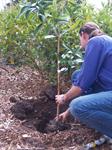
Study Horticultural Research
Aimed at:
- Horticultural scientists
- Landscape Architects
- Horticultural Business Managers
- Horticultural Business Development Managers
Develop the skills and knowledge needed to plan, conduct and report on research in social, technological and environmental issues that impact on Horticulture today and which are needed for strategic business planning.
-
This course has been developed by professionals in both Australia and the UK, with the aim of being relevant throughout the world.
-
This is a module in the Royal Horticultural Society’s Master of Horticulture; but is also available for study by itself.